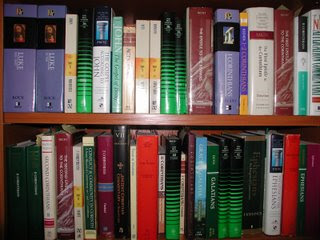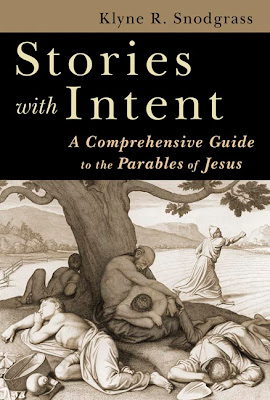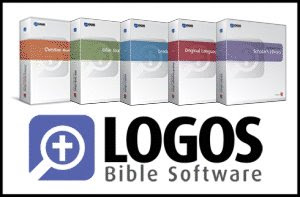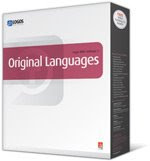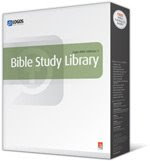
The following announcement came through the BNTS:
Dominican Biblical Institute, Limerick
In association with the Dept of Theology and Religious Studies,
Mary Immaculate College,
University of Limerick
Two PhD/Post-doc Scholarships
Project on Christian Origins
On Tracking the Development of 1 Corinthians, the Gospels and Acts
and thereby Contributing to Clarifying
the Synoptic Problem and the Quest for History
2008: Second stage of the Project--in conjunction with an auxiliary project on Genesis' use of Homer
The Dominican Biblical Institute (DBI), Limerick, Ireland, is seeking applicants for two scholarships which will be awarded to suitably qualified candidates for three years, beginning in the Autumn/Fall semester, 2008.
The scholarships are intended primarily for those working towards a PhD, but may exceptionally be adapted for post-doctoral candidates. They are to work in particular areas that fall within the scope of the Projects named above and of which details are given below. The PhD for successful work will be given by the Dominican Biblical Institute, accredited by Mary Immaculate College, University of Limerick (MIC/UL). The awarding body is the University of Limerick.
The amount of the scholarship is EURO 15,600 per year plus fee waiver, for three years of full-time study. It will require beneficiaries to participate actively in the overall research project of the DBI and to make occasional academic contributions to the work of the Institute. The terms and conditions of the award are adapted from Mary Immaculate College, UL. In line with the ethos of the Institute as a whole, participants will be encouraged to interact with the surrounding community in Limerick and the west of Ireland.
Applicants should send a CV, two academic references, and a statement outlining their academic interests and their reasons for wishing, first, to undertake one of four PhD topics outlined below and, secondly, to participate in the overall project of which it is a part,to:
The Secretary,
Dominican Biblical Institute,
Upper Cecil St.,
Limerick, Ireland.
For further information or informal discussion, contact Dr. ThomasBrodie,
tel. 353 (0)61 - 490 605.
Closing date for applications is Saturday 10th May, 2007, or as long as is necessary to find suitable candidates. The Institute may decide to interview candidates as part of the selection process. The selection will be made by the DBI Academic Council, following consultation with the Awards Council.
Outline of Main Project
The project of which the PhD research will form a part concerns tracking the sources and compositional methods of the New Testament writers, and thus clarifying the literary development of the gospels, Acts, and epistles. Emphasis on literary composition does not exclude other aspects of research, but it recognizes that at this stage in New Testament studies the literary aspect provides a pivotal opportunity. Furthermore, and crucially, clarification of sources and composition will greatly facilitate investigation of other aspects, especially history, sociology and above all theology.
This project does not come out of a vacuum. It builds on a literary movement that, despite its occasional difficulties, has been gathering momentum for over thirty years. The terminology of this movement varies between Jewish, Greco-Roman and modern--and the terminology itself needs clarification--but, with new awareness of ancient writing methods, and with increasingly reliable criteria for detecting the use of sources, it is now possible, as never before, to trace how New Testament writers refashioned older sources, especially the older scriptures.
It is also becoming possible as never before to trace whether or how the New Testament writers used one another, whether, for instance John used the other gospels, or, as has sometimes been suggested, Luke used 1 Corinthians (and other epistles). And it is possible too, within the context of this overall project, to contribute to solving the Synoptic Problem.
The project focuses primarily on the gospels and Acts but some account is also taken of the epistles, and particular attention will be given to examining the sources, composition and nature of Christianity's oldest extensive document--1 Corinthians. This attention to 1 Corinthians will include a conference that builds on the experience of the 2005 Limerick international conference that produced The Intertextuality of the Epistles. Explorations of Theory and Practice, eds. T. L. Brodie, D. R. MacDonald, S. E. Porter (Sheffield: Sheffield Phoenix, 2006).
Apart from scholarly presentations and conference papers, the project will also be responsible for publishing an accessible book on the role of the New Testament within the development of civilization, literature and theology, and on the role of Jesus in personal spirituality, in the churches, and among world religions.
The principal overseer is Dr Thomas Brodie, who is responsible for the overall management of the project and who, along with Dr. Jesse Rogers, Senior Lecturer in Scripture at Mary Immaculate College, Univ. of Limerick, will supervisor the PhD research projects. Visiting scholars will also give support. Occasional expertise and input will be available from an Academic Advisory Board: Calum Carmichael (Cornell University), Paul Elbert (Church of God Theological Seminary), Wilfrid Harrington (Priory Institute, Dublin), Damien Nelis (University of Geneva), Carol Newsom (Emory University), Stanley Porter (McMaster Divinity College, Hamilton, ON), Carol Stockhausen (Marquette University).
Those engaged in the project, including the persons appointed to the scholarship, will be expected to collaborate and to work as a team. There will be regular project meetings and occasional research seminars--particularly to give support.
While all four areas can contribute to a single project, each area is also capable, to a significant degree, of standing alone, and so the outcome in one does not determine the outcome in others. Among the four areas, each applicant may designate a first, second and third choice. Within the broad parameters of an area, a student may wish, as work progresses, to focus the research on an aspect sufficiently specific so as to produce a dissertation within the allotted time.
Dissertation areas
The four dissertations will focus on the Gospels and Acts--though as an exception a scholarship may be awarded for work on 1 Corinthians. The four basic areas are:
1. PROTO-LUKE.
The Septuagint, the Elijah-Elisha Narrative, and the Testing of the Theory of Early Luke ("Semitic" Luke, or "Proto-Luke") Since the 1890s diverse evidence has indicated that Luke or Luke-Acts once existed in a shorter form--a form sometimes referred to as "Proto-Luke"--and if that form could be identified it would provide a crucial missing link in the history of the gospels' development. For decades the evidence seemed inconclusive and the existence of Proto-Luke was correspondingly vague. However, the situation has begun to change:
* Increasing clarity concerning Luke's imitation of the Septuagint, especially of the Elijah-Elisha narrative, has made it easier to trace his context and methods
*The sharpening of criteria for detecting direct literary dependence has facilitated the distinguishing of sources and levels within Luke-Acts
*Recent detection of clear structures in several biblical texts, including Luke-Acts, has added a further element by which to detect levels within Luke-Acts.
The challenge for the recipient of the scholarship will be to make a fresh critical assessment of (part of) the evidence for Proto-Luke and to move the investigation to a new level.
2. The Making of Mark. The Role of the Elijah-Elisha Narrative and of Elijah/Elisha-related Texts
Despite considerable progress in Markan studies--for instance, concerning a certain priority, social aspects, and literary and theological sophistication--a central puzzle has remained regarding the origin and nature of much of Mark's content, his narrative. (Form criticism clarified key features of individual passages, but not their origin and overall nature, particularly whether, despite the forms' roots in orality, the texts themselves were literary in origin). However--even while the genuine insights of form criticism were proving vague and incomplete--recent decades have clarified Mark's kinship with known texts, Greco-Roman, Christian, and Jewish, particularly the older scriptures and subsequent scripture-based writings. The second scholarship will focus on the contribution of these latter texts--the older scriptures and subsequent scripture-based writings--to Mark's narrative. Particular attention will be given to the Elijah-Elijah narrative--a text reflected in Mark's beginning, middle and end--and to Luke's use of that narrative.
3. The Making of Matthew and the Role of Elijah-related Luke
Given widespread agreement that Matthew used Mark, it is necessary to examine whether Matthew also used some of the scripture texts reflected in Mark--the Septuagint, the Elijah-Elisha narrative and also some of the Lukan passages that reflect the Elijah-Elisha narrative. This investigation will also address in some way both the ancient tradition that Matthew arranged sayings (logia) and the modern hypothesis of a sayings source (Q) shared by Matthew and Luke. One episode of the hypothetical Q source--the account of the centurion's servant--may provide an opportunity to test the relationship betweenMatthew, (Proto-)Luke and John.
4. Luke, Matthew and the Making of Canonical Luke-Acts
The essence of this dissertation is to clarify whether Luke-Acts, apart from using Mark, also used Matthew. The idea of Luke's use of Matthew is not new, but the issue has become stalemated for lack of credible context and criteria. The challenge for the applicant will be to clarify the context, to assess recent research on criteria, and to apply the criteria rigorously to the case in question.
In asking whether Luke actually used Matthew the thesis will also need to engage in some way the larger issue of the formation of Luke-Acts as a whole, including the questions of the Synoptic Problem, and Luke's possible relationship to other sources, including John.
Auxiliary Project: Genesis' Use of Homer
An auxiliary project concerns the formation of the Primary History (Genesis-Kings). This will focus initially on Genesis--on Genesis' use of the major prophets, and on Genesis' use of Homer. Applications are welcomed for scholarships promoting such research work on Genesis.

.jpg)
